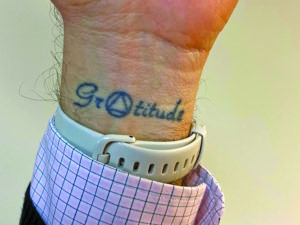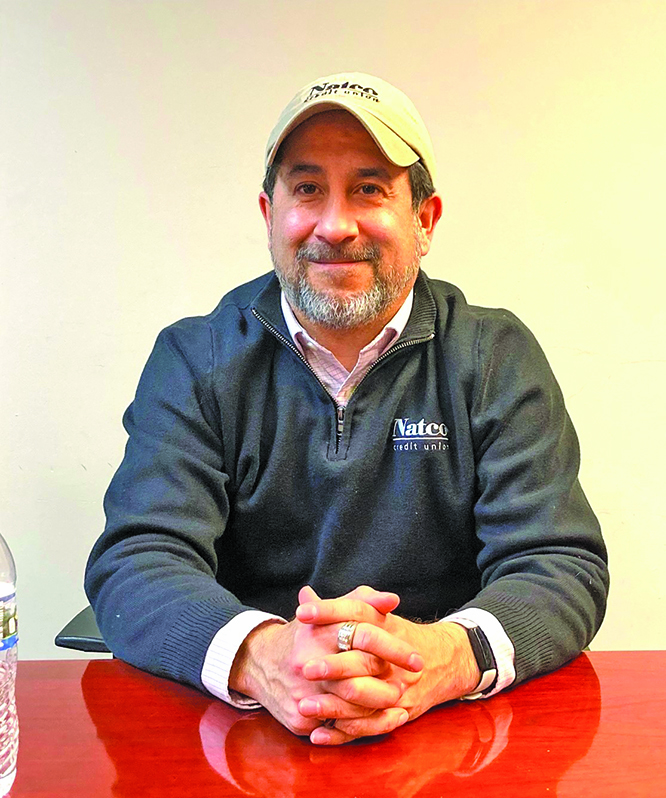Community service comes partly from man’s own experience of homelessness
One of the faces becoming recognized as an up-and-coming community leader has a story to share about his journey to Richmond.
Doug Macias said one reason the effort to open a warming center became important to him is that he had spent time being homeless. Every person experiencing life without a house is “still someone’s son or daughter,” he said, and all deserve respect and care from their community.
Macias, 46, served as co-convener for the ad hoc group after having served as a volunteer at a warming center that opened over Christmas weekend. He is the community development manager for a local credit union, having moved to Richmond for that job just under two years ago. He is active on other community boards. The Wayne County Area Chamber of Commerce recognized him during its Jan. 20 annual meeting as an outstanding committee member.
All of that is a whole new life for Macias. He shares his story in the hope that it might help other people who find themselves in difficult situations.
A high school graduate who briefly attended college, Macias became a credit union CEO at age 30. He then had an eight-year career in marketing services to credit unions, such as asset management and providing the legal forms needed for loan processing.
Then came 2016, what he calls his “spiral year,” when life took a turn. A good friend that he hadn’t seen in years suddenly died, his father had his first bout with prostate cancer, he turned 40 and a friend in St. Louis died in the line of duty.
“I thought the solution to my problems was drinking and drug use, bury my head and make more money,” he said. “I was making money (six figures) but I was spending it quicker. My goal was to minimize the impact, not to get better.”
He tried counseling, therapy, and a crisis center.
“On Dec. 30, 2016, at 6 o’clock at night, I closed out the books on my best year ever. And at 7 p.m., I walked into my first meeting.”
Macias says that getting and staying sober isn’t easy.
“A little over a year of being sober, I started working toward my next relapse,” he said. “After a year, I got the new job, got the new girl, and slowly but surely I was putting sobriety on the back burner. One day I got sick and missed a meeting, and that turned into a week, a month, and I got away.”
At about the time he started counting the places where he could get a drink on the way home, his old therapist reached out to him and told him she thought he might be depressed. He thought, “I’m a man, I don’t get depressed.”
Then, his doctor told him, “You believe you have the disease of alcoholism. Maybe, just maybe, you have the disease of depression. Maybe you need to treat your disease daily.”
Since that realization, he has been trying to heal, knowing that his depression is seasonal, getting worse at some times of the year. He’s remained sober since December 2016.
Still, homeless by the end of 2020, he tried to hide his circumstances.
“Once I got evicted, I stayed with a couple friends, found a house to rent short term, but it was more than I could afford.” He stayed in hotels for a while, “and that’s what led to ‘thinking’ I could make my car work, and then to a shelter.”
With recovery meetings and counseling, Macias came to realize that he’d been hiding from the causes of his behavior. While he realizes now that some of what happened during his teen years led to later problems, he adamantly refuses to publicly point the finger of blame at others.
A major blow came when his parents divorced during his high school years. He started doing drugs and alcohol and wrapped his car around a telephone pole at 21.
“I realize now, (the divorce) broke pieces inside of me.”
After many years of having a rocky relationship with his father, Macias decided he wanted a loving relationship with him. He had about 10 good years with his father before his death in 2018.
“In the early part of sobriety, I asked what drives me,” he said. “What drives me is to be the son I should have been, the man I should have been.”

He has the word “gratitude” tattooed on his wrist because he is grateful to have had the experiences he has and to be on an upward spiral. In the middle of the tattoo is a triangle in a circle, an emblem adopted by Alcoholics Anonymous as the Sobriety Circle.
“Two things I hold on to: My sobriety and God, that it will all work out the way it is supposed to,” Macias said.
He wears several rings on his fingers, calling them “things that give me hope and strength.” One is his father’s ring with the Lord’s Prayer engraved on it. Another is his grandfather’s wedding band.
He sees his own experiences as motivation to try to help people experiencing homelessness. Shelters do the best they can, he said, but living there was not easy: sharing sleeping quarters with three other men and using a shared bathroom.
Macias said part of being who he should have been involves being active in multiple recovery groups as well as nonprofit boards and the warming center project. He has a hard time saying no when someone asks him to help.
“When you’ve been there yourself,” he acknowledges, “you kind of see things that other people just ignore.”

